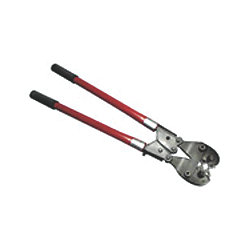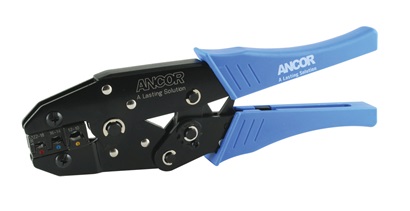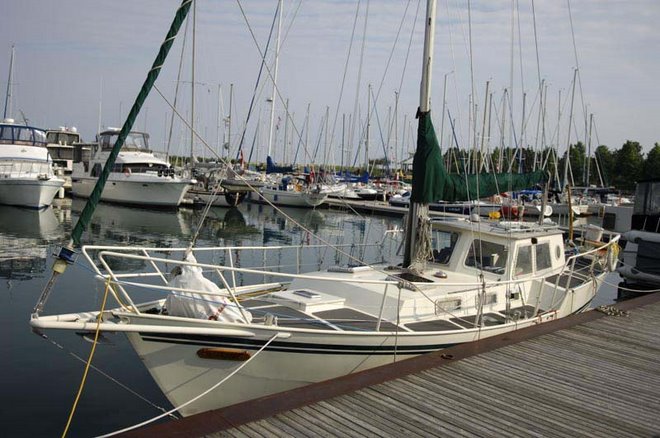 |
| FTZ Correct Crimper: Using this is like being a mohel for a Transformer. |
Because we bought an old house in 1998 and I bought my first old sailboat in 1999, I was thrown headlong into the timeless debate of whether to buy the "excellent, but expensive" tool or part or the "cheaper and less well-made" tool or part and suffer come what may. And suffer I surely did.
 |
| Also not cheap, but very effective: Double-crimped heatshrunk adhesive connectors stay both dry...and connected. |
Of course, having bought a house
and a boat, I had no money left and had to do the vast majority of my
own repairs and improvements. That's OK; that's what I deserved having
ditched shop class to chase girls in drama class. Je ne regrette rien, ladies.
 |
| 1/2 inch Mastercraft torque wrench: I thought this was just going to be for the engine, but I use it all over the boat. |
It wasn't long before I grasped that saving on tools and parts wasusually a mug's game, and that "China" meant "disposable". I don't blame China for that, actually. They are often making tools and parts to North American specifications that favour the lowest bidder and there's no incentive to sell one superb tool that will last forever when 10 pieces of crap will sell for $29.95 at a door-crasher sale to people who, you know, won't be offshore and will really need non-bendy long-arm pliers not made of pot metal.
 |
| "Thumb ratchets" are of limited use, but when I've needed them, I've absolutely needed them, |
So now I buy tools of quality and I follow independent contractors to where they shop. I read the reports of working marine technicians for tips and tool selection: I have, for instance, heeded Maine Sail's sage advice and have crimped about 100 power lugs aboard the boat in the last year. Therefore the huge "professional-grade" crimper at the top of this post I thought was stupidly expensive when I bought it has since paid for itself. I'll do your crimps, too. I work for rum and/or diesel.
 |
| Channel Lock brand tongue and groove pliers: Essential to remove and screw down the cap on the standpipe, but handy for less-obvious jobs, like dogging down the nut to secure fairing blocks. I have an equally fearsome crescent wrench. |
At the same time, surrounded by nice tools and quality parts, I have realized that, in many cases, the word "marine" before any other noun means "triple the price for this approaching sucker". I have, for instance and to defer such rip-offs learned to fashion gaskets and seals from gasket and seal materials instead of buying the made-up gasket kits. I've also successfully removed old gaskets without tearing them to use as spares. I have also learned how to do splices and sail repair with the right tools; they aren't pretty yet but they are strong.
 |
| The rubber mallet: Good for dent-fixing and crew morale. |
Still, there's some exceptions here: Tools and water seem magnetized and consequently I keep "deck tools", poor or indifferent quality gear that I won't miss if it goes into the drink. The Makita drills never leave the pilothouse, but the no-name hand drill? Sure, because it cost $11. I also get good old Stanley and Craftsman hand tools from garage and estate sales. I apply Boeshield, bag 'em and leave 'em around the boat. A lot of people rightly leave softwood plugs strung to thru-hulls. I also leave a Vise-Grip wrapped in greasy plastic...it's cheap insurance. And sometimes even a tool that I suspect is utter crap internally has attributes that separate from all others into the "really useful" category. Such is this oddball battery screwdriver: it fits where others don't, and if I don't need heavy torque, it's handy as hell to date. Please forgive the cheesy video:
I think my point here is that if you expect top quality, pay for it and do so cheerfully. Or scour the online want ads. A lot of quality tools, if often worn, can be had that in terms of durability and function that exceed many lower-end new tools. There's no middle ground here: the next purchase might as well be crap you can easily sacrifice after the one job you need it for.
 |
| The crappy Leatherman/Gerber mulltitool knock-off I still have is so old I can't find a picture of it, but I still use it so much that sliding it from hand to pocket keeps it shiny. |




